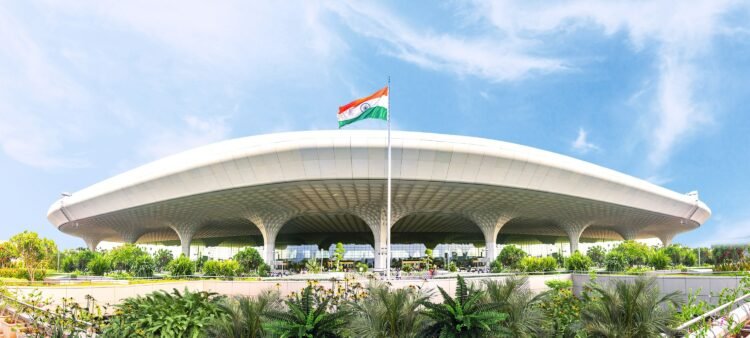MUMBAI (India CSR): Under the zero-water discharge policy, CSMIA maintains 100% recycling of treated wastewater for cooling, landscaping, washing, etc. It is the first Indian airport to implement waterless urinals that reduce water wastage; CSMIA has converted approximately 539 urinals across both terminals which have aided the airport in saving up to 1 lakh litres of water per day.
Chhatrapati Shivaji Maharaj International Airport (CSMIA) Mumbai has executed various initiatives to align with the Sustainable Development Goals (SDG) through the incorporation of environmental dimensions into every decision-making process.
Resource conservation is embedded through CSMIA’s operational activities; the airport has undertaken various initiatives to conserve available water resources, by systematically managing activities and operations to reduce water consumption across the airport terminal.
Measure and monitor the quantity of water
CSMIA has a standard process to systematically measure and monitor the quantity of water consumed and identify operations where water conservation techniques can be implemented such as Water efficiency projects (including water-efficient plumbing fixtures), waterless urinals, etc. intending to reduce the fresh water consumption.
Under the zero-water discharge policy, CSMIA maintains 100% recycling of treated wastewater for cooling, landscaping, washing, etc. Other initiatives have resulted in a reduction of water consumption to about 40% due to various conservation measures, such as rainwater harvesting, drip irrigation, wastewater treatment & recycling, and water efficiency projects, to name a few.
Thereby CSMIA has successfully recycled 281.21 megalitres and 415.46 megalitres of water during FY 2018-19 and FY 2019-20 respectively, which amounts to 20% and 35% of total water consumption during FY 2018-19 and FY 2019-20 respectively.
Rainwater tanks
CSMIA has a capacity of 26 Lakh Liters of rainwater tanks and 229 rainwater harvesting pits across the terminals for recharge of the groundwater table to ensure water efficiency. Water consumption value stood at 1,186.12 megalitres and 765.45 megalitres during FY 2019-20 & 2020-21 respectively.
The substantial growth in air traffic movement has led to a significant surge in the consumption of resources at the airport. During daily operations, a large quantity of water is consumed at the airport to support various activities encompassing restrooms, food service, heating, ventilation, air conditioning, construction, landscaping, and cleaning amongst others.
Furthermore, the increased water usage by airports leads to the generation of large volumes of wastewater. Hence, the implementation of sustainable water management practices is essential within the aviation industry to minimize the sector’s impact on natural resources.
Sustainable techniques
CSMIA has time and again adopted sustainable techniques to manage water to further limit the water footprint and ensure that no water bodies are affected due to operations at the airport.
CSMIA strives to minimize freshwater consumption by an increase in operation efficiency, increase in recycling and reusing the wastewater generated throughout the process.
The airport’s constant endeavors towards conservation and management of water have resulted in a reduction of freshwater consumption supplied by the municipality. CSMIA follows various sustainable water management techniques, enabling it to monitor and measure the overall water consumption and explore opportunities to enhance water management practices. It has also undertaken initiatives to create awareness amongst its stakeholders and ensure their active participation in water conservation efforts.
Water usage for airport operations results in the generation of wastewater with contaminants such as suspended solids (SS), oil and grease (O&G), residual chlorine amongst others, that can pollute the surrounding soil, surface water and groundwater; it needs to be adequately treated before being discharged.
Sewage Treatment Plants
Understanding this need, the airport has leveraged technological aid and installed Sewage Treatment Plants (STPs) to treat the wastewater generated at the airport premises from various sources such as the terminal buildings, airside, landside and cargo facilities.
These STPs are based on the Sequential Batch Reactor (SBR) technology followed by Ultra Filtration (UF) and Reverse Osmosis (RO) and have a collective capacity of 15 MLD. The resulting treated water is used for alternate functions such as for the restrooms, cleaning or Heating Ventilation and Air Conditioning (HVAC) in terminal buildings to name a few.
Ensuring an optimum level of quality of the water as well as minimizing its freshwater consumption, CSMIA continuously recycles the treated water to make it compatible for various uses across its operations.
CSMIA has redefined the cleaning and disinfection processes at the airport by undertaking sustainable water management operations.
Through continuous efforts and the use of innovative tools to increase efficiency, CSMIA diligently ensures no water bodies are affected due to the airport operations. The airport continually strives to optimize its operational efficiency and adapt to increasingly stringent environmental standards to support sustainable growth.
(India CSR)























